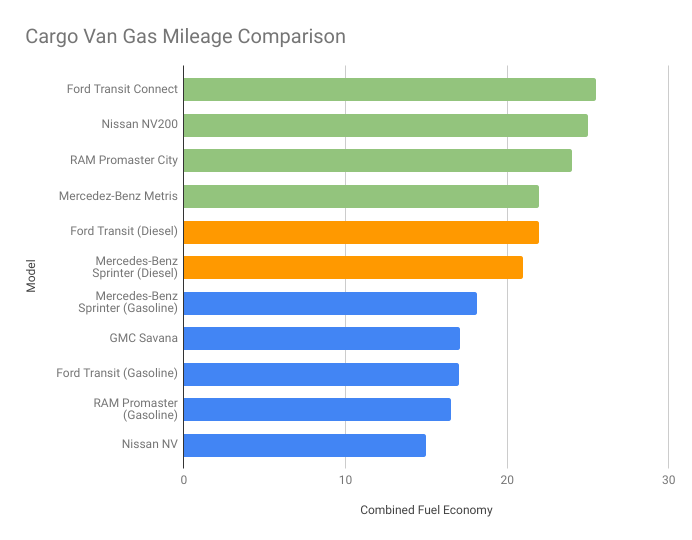SierraVanCampers
Well-known member
Just for comparison. Chevrolet Express 2500 Extended Van with a 24" raised fiberglass top with camper build. 6.0 V8. Just returned on a trip and averaged exactly 16.0.

The Ecoboost 3.5L is designed for power not economy... in the pickup it gets the same MPG as the 5.0L V8. If they put the 2.7L EB in the vans, that would be a good pick for mpg. Your other choice is the 3.3L NA V6, which would be my pick, mostly for simplicity and size in the engine bay, and less weight. Best MPG also. It comes with the 10 spd. With a low gear differential, a locker, 2" lift and bigger tires it would get around fine offroad.My understanding is that all the Transits are at the same body, same two 6 cylinder engine choices.
So a short wheel base normal roof with the Ecoboost engine probably gets the best mileage.
I have a SWB med roof transist with the 3.7L. I average low 20's MPG.
All things being equal, a big engine should last a little longer... that's if you don't actually use the extra HP of the big motor. Plus with decent maintenance, there is very little wear in normal operating conditions; rather it's cold starts that cause most of it.I wonder about fuel economy Vs. longevity. A smaller engine will get better fuel economy, but it will be working harder in many instances. Transmissions are also a consideration. Small engine = small transmission. These items cost thousands to replace, and if you need to replace one there is the possibility of needing to replace the other in the near future.
Ya, those Hiace vans are great. They can't sell them in the US because of crash standards and the forward cab position... even though it's more practical in many other ways.these have diesel engines which last forever, but hard to get parts and drive on the right side. Really want one. They are not that expensive like a Mercedes camper, in the 20K or so range, made by Toyota in Japan.

I don't think it really is that simple. There are ample examples of small engines that run forever under reasonable loads.I wonder about fuel economy Vs. longevity. A smaller engine will get better fuel economy, but it will be working harder in many instances. Transmissions are also a consideration. Small engine = small transmission. These items cost thousands to replace, and if you need to replace one there is the possibility of needing to replace the other in the near future.
I agree. For a small space being able to sit up straight is important, but being able to stand isn't.Honestly the only time I need to stand up in my van is to put on clothes.
Happy I went with a med roof Transit instead of the high roof transit which can't do drive throughs and much be even more of a sailboat when semis blast by.




Omg i have a Ford Transit 150 short body medium roof passenger and i get only 16/17mpg. Maybe 18 on a slight downhill Why??Great! I have a Ford Transit 350 Medium roof long wheelbase...I get an average of 17.8 mpg. On a long stretch of flat freeway with little wind resistance it can be over 20 mpg, but goes down to 15-16 mpg if I'm gaining elevation or in a strong wind, or on slow roads or forest roads.
How fast do you drive? I find the mileage goes down when you go up over 60-65 or so.Omg i have a Ford Transit 150 short body medium roof passenger and i get only 16/17mpg. Maybe 18 on a slight downhill Why??
Wow, that's interesting. I would think that since you have a short wheelbase and lighter van (150 is less weight I believe) yours would get better mpg. Do you have a heavy load in it?Omg i have a Ford Transit 150 short body medium roof passenger and i get only 16/17mpg. Maybe 18 on a slight downhill Why??
Anecdotes of mpg are always all over the place. Speed, wind, altitude, drafting, temperature, driving style, tires, etc... make a difference. Best to check Fuelly for comparisons. Those are anecdotes too, but at least there are a lot of them.Wow, that's interesting. I would think that since you have a short wheelbase and lighter van (150 is less weight I believe) yours would get better mpg. Do you have a heavy load in it?
I had a 2015 transit 150 med roof with the 3.7 liter. I could average 20mpg keeping the RPM's under 2000 is the key. That means 62 on the hwy's.Anecdotes of mpg are always all over the place. Speed, wind, altitude, drafting, temperature, driving style, tires, etc... make a difference. Best to check Fuelly for comparisons. Those are anecdotes too, but at least there are a lot of them.
The newer one is a 3.3L... much better MPG and more power to boot.Dont think the 3.7L is bad at all.
Or using the electric drive instead for acceleration and regen. There is very little benefit at highway or even slower but steady speeds, though. If you are driving around in cities a lot it would be a benefit.the whole point of hybrids is running the engine in the ideal power band where it gets the best mileage.
Ford Transit, cost to own: https://www.edmunds.com/ford/transit-van/2019/cost-to-own/With a newish vehicle the cost of driving IS fuel, period.